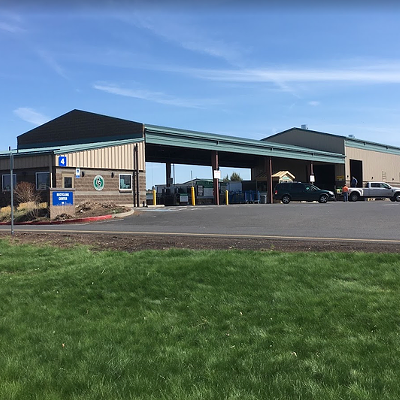In the spring of 2014, the Central Oregon Snowbusters Club and the LaPine Lodgepole Dodgers Snowmobile Club began performing trail maintenance in the Deschutes National Forest in Bend. Thirty-one miles of trails were damaged near the Wanoga Sno-Park, the Edison Sno-Park, and the Newberry National Volcanic Monument. District Ranger Kevin Larkin says a few months passed before the agency discovered the damage, including uprooted mature trees and trails cleared using heavy machinery, which would normally require a proposal to be approved by the U.S. Forest Service.
The work took place in the spring of 2014 and it wasn't until midsummer that a Forest Service crew discovered the damage.
A member of the Central Oregon Snowbusters Club agreed to an interview, but later declined to speak on the record.
"We do not want to elaborate at all. This thing happened in 2014. It's all been worked out with the Forest Service," says Vera Riser, president of the Central Oregon Snowmobilers Club.
Phone calls to several members of the LaPine Lodgepole Dodgers were not immediately returned.
The damage, estimated at $200,000 by the U.S. Forest Service, is not the exact price tag placed on the cost of rehabilitating the forest, according to Ranger Larkin. "Some of that total includes pieces in a few cases that can't be restored—the mature trees that were tipped over, those have value in each tree—and so we tallied that in and that's included in that number, but it's not as if we can go and replace a mature tree as part of our rehabilitation."
The U.S. Forest Service settled on a $70,000 cost, taking responsibility for miscommunication with the snowmobiler clubs. "Ultimately we decided that we share some of that burden, so we've split the cost 50/50 with the Oregon State Snowmobile Association for the $70,000 of critical work that is necessary that is taking place," says Larkin.
When volunteer groups receive permits to maintain trails, Larkin says routine upkeep includes things like using chainsaws and whoopers to remove downed logs and to cut back brush. "In some cases we will let them use machinery to cut back brush where the brush is growing into the trail more intensively than in other places," he says.
Larkin notes that volunteers are crucial to the upkeep of trails. "This particular instance was just a small piece of a much, much larger program that we've had great success with," he says. In 2015 slightly fewer than 2000 volunteers contributed a total of approximately 52,000 hours of work done on the behalf of the national forest.
"If the work that they are proposing goes beyond that scale of where heavier equipment would be needed, then we would go through a different evaluation process to make sure that everything matched up with resource protection goals and matched up with the goals for the trail and for the surrounding areas," he says.
Another misstep with the snowmobile clubs occurred in the supervision process. "We had a system at the time in 2014 that had some loopholes in it—not by anybody's fault, not by anybody's inattention or malicious intent, those loopholes kind of came to bear and the clubs went forward thinking they had approval and we went forward thinking that they were intending something different," Larkin says.
"What we concluded is that certainly the clubs bear some of the burden because they did go outside of what was allowed in their volunteer agreements in their permits," he says. The Forest Service takes its share of the responsibility because it didn't provide the level of oversight that would have prevented the damage. This was due to an intense fire season, when those responsible for oversight activities were out helping with the fire effort, he says.
A statement by the Oregon State Snowmobile Association said, "All trail maintenance and grooming activities provided by OSSA and member clubs are conducted through a valid permit signed by local Forest Service officials. All of these volunteer efforts are intended solely to help address potential hazards to winter recreationalists that can hide dangers that, if not addressed, could potentially cause injury or death to unsuspecting trail users."
The statement cites miscommunication between the Forest Service and the snowmobile clubs, and also states that some of the damage was "the result of natural forces."
In the future, Larkin says systematic checks are in place to prevent this type of situation from happening again. "Now we have a much more consistent and thorough process whereby any work that's outside that very basic brushing and regular trail maintenance needs to come to us in written form and it has to be reviewed at multiple levels," he says. "Ultimately, I have to approve it in writing before that work can commence and that's one of the steps that was missing," he says.
Currently, Larkin says the Forest Service doesn't have any maintenance projects underway. He says there is one permit that has been issued to the Central Oregon Trail Alliance to construct new mountain bike trails, but work is not scheduled to begin at this time due to a forest restoration project that will affect the same area.





















